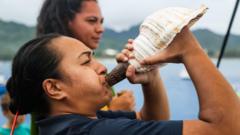Despite their picturesque appeal, the Cook Islands stand at a crossroads as the government pushes for deep-sea mining of polymetallic nodules, rich in cobalt and nickel. Prime Minister Mark Brown champions this initiative, promising that these resources could transform the economy and improve local lifestyles. However, environmental activists are sounding alarms about the implications for marine ecosystems, urging more research before proceeding.
Jean Mason, curator of the Cook Islands Library and Museum, is optimistic about the future—citing the historical significance of these nodules and supporting their extraction. In her view, the mining project can sustainably generate revenue despite critics noting that the ecological costs are still uncertain. Mining could offer opportunities for education and healthcare advancements, as envisioned by the Prime Minister.
As the potential for economic uplift hangs in the balance, the government has issued exploration licenses to three companies. Yet, the push for deep-sea mining has sparked public outcry and protest from concerned citizens who insist on understanding the environmental ramifications of this venture.
"In the deep sea, we are risking more than just natural resources; we are risking our heritage and future," warns activist Alanah Matamaru Smith. Many islanders express unease about a lure of quick profit potentially overshadowing the long-term impact on their identity and environment. While the government argues that such developments are necessary for financial stability in the wake of climate change, critics suggest a moratorium is essential until definitive studies are conducted.
Amid rising tensions, the discussions surrounding the mining plan reflect broader global challenges related to environmental preservation and resource exploitation. As the Cook Islands navigate these waters, the future of their ecosystems and economy remains uncertain.
Jean Mason, curator of the Cook Islands Library and Museum, is optimistic about the future—citing the historical significance of these nodules and supporting their extraction. In her view, the mining project can sustainably generate revenue despite critics noting that the ecological costs are still uncertain. Mining could offer opportunities for education and healthcare advancements, as envisioned by the Prime Minister.
As the potential for economic uplift hangs in the balance, the government has issued exploration licenses to three companies. Yet, the push for deep-sea mining has sparked public outcry and protest from concerned citizens who insist on understanding the environmental ramifications of this venture.
"In the deep sea, we are risking more than just natural resources; we are risking our heritage and future," warns activist Alanah Matamaru Smith. Many islanders express unease about a lure of quick profit potentially overshadowing the long-term impact on their identity and environment. While the government argues that such developments are necessary for financial stability in the wake of climate change, critics suggest a moratorium is essential until definitive studies are conducted.
Amid rising tensions, the discussions surrounding the mining plan reflect broader global challenges related to environmental preservation and resource exploitation. As the Cook Islands navigate these waters, the future of their ecosystems and economy remains uncertain.


















